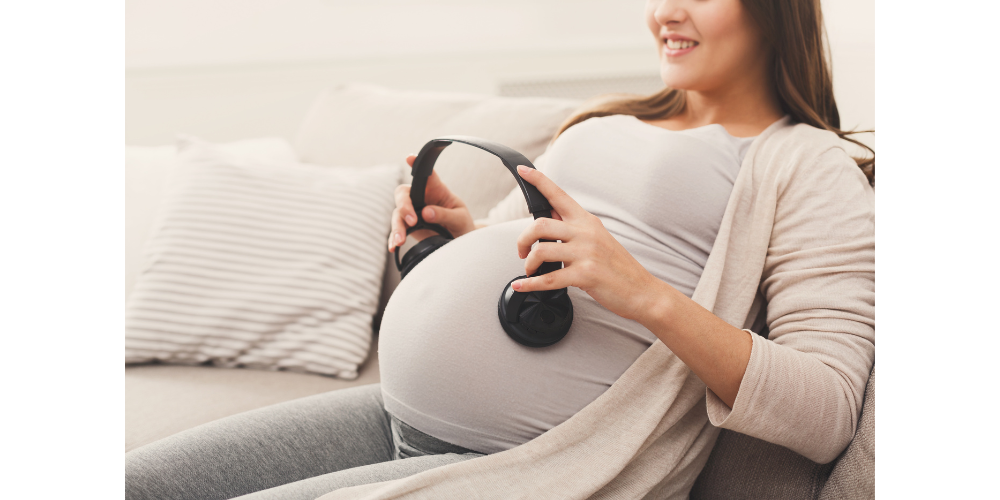Did You Know? How Babies React to Music in the Womb
Category: Fun Facts & Educational Content
There's something almost magical about the idea that your baby can hear you before they're even born. But it's not just your voice they're listening to—your little one is also tuning in to the music around them. Whether it's your favorite playlist, a lullaby you hum while folding laundry, or even the rhythm of your heartbeat, sound plays a beautiful role in your baby's development long before their first breath.
If you've ever wondered whether playing music for your bump makes a difference, you're not alone. The connection between music and babies in the womb has fascinated parents and researchers alike for decades. And the findings? They're as heartwarming as they are incredible.
When Can Babies Actually Hear Music?
Your baby's ears begin to develop around the fifth week of pregnancy, but they don't start hearing sounds until much later. By around 18 weeks, the inner ear structures are developed enough to detect vibrations. And by the time you reach 25 to 27 weeks, your baby's hearing is much more refined—they can recognize voices, respond to sounds, and yes, even react to music.
At this stage, sounds from the outside world are muffled, kind of like listening to music underwater. But your baby can still pick up on rhythms, tones, and melodies. Your voice, however, comes through the clearest because it's transmitted through your body. That's why talking, singing, or reading to your baby during pregnancy can create such a strong bond even before birth.
How Do Babies Respond to Music?
Here's where it gets really sweet. Studies have shown that babies don't just passively hear music—they respond to it. You might notice your little one kicking, wiggling, or shifting position when a favorite song comes on. Some parents swear their babies have musical preferences even before they're born.
Research suggests that babies can remember melodies they heard in the womb, too. In one study, newborns showed recognition of a lullaby their mothers played repeatedly during pregnancy. They became calmer and more alert when they heard it again after birth. It's like they already had a soundtrack to their tiny world.
Different types of music can also evoke different responses. Classical music, especially pieces with steady rhythms like Mozart or Vivaldi, tends to soothe babies. On the other hand, louder or more upbeat music might get them moving. But every baby is unique—some might love a gentle folk song, while others seem to groove to jazz.
The Science Behind the Magic
So why does music matter? It's not just about entertainment. Exposure to music in the womb can support your baby's auditory development and even lay the groundwork for language skills. The rhythmic patterns in music help your baby's brain recognize structure and timing, which are essential for speech and communication later on.
Music also has a calming effect on both you and your baby. When you're relaxed and happy, your body releases feel-good hormones like serotonin and endorphins—and your baby benefits from that, too. Playing soothing music during stressful moments can help regulate your heart rate and breathing, creating a more peaceful environment for your little one.
Some studies even suggest that babies exposed to music in utero may develop better memory and attention skills as they grow. While more research is needed, there's no denying that music creates a positive sensory experience that can enrich your pregnancy journey.
Creating Musical Moments with Your Baby
You don't need to be a musician or have a fancy sound system to share music with your baby. It's really about the connection and the intention behind it. Here are a few simple, cozy ways to incorporate music into your daily routine this fall:
Sing to your bump. It doesn't matter if you're not pitch-perfect. Your baby loves your voice more than anyone else's. Try humming a lullaby while you're getting ready in the morning or rocking gently in a chair before bed.
Play your favorite songs. Whether it's a nostalgic playlist from your younger years or calming instrumental tracks, let your baby share in the music that makes you feel good. Keep the volume moderate—remember, sounds are amplified inside the womb.
Attend a live performance. If you're up for it, a cozy acoustic concert or a fall festival with live music can be a special experience. Just be mindful of volume levels and take breaks if needed.
Make it a bonding ritual. Set aside a few minutes each day to sit quietly, play music, and place your hands on your belly. Notice how your baby responds. It's a beautiful way to tune in to each other.
A Soundtrack Worth Remembering
The music you share with your baby now might just become part of their story. Imagine playing that same lullaby to soothe them as a newborn, or hearing them hum a tune you sang to your bump months earlier. These are the moments that become memories—the kind you'll treasure as your family grows.
And while science continues to explore the amazing ways babies experience sound before birth, one thing is already clear: the love, care, and intention you pour into these small moments matter deeply. Your baby is listening, learning, and connecting with you in ways that are truly extraordinary.
Capture the Magic Before It Changes
Your pregnancy is filled with fleeting, precious moments—and music is just one of the many ways your baby is already becoming part of your world. Why not capture this special time with an ultrasound session that lets you see your little one while they're still cozy inside? At our studio, we offer detailed 3D and 4D imaging that brings you closer to your baby than ever before.
Book your session today and receive a complimentary keepsake photo when you mention this blog. Let's celebrate this beautiful chapter together.



